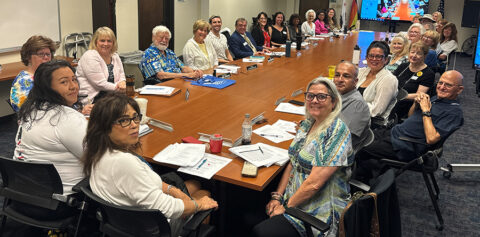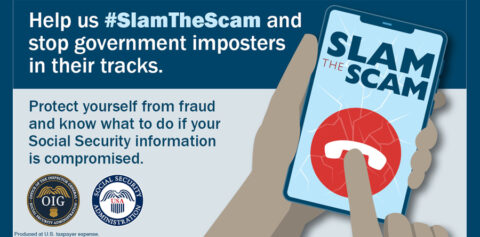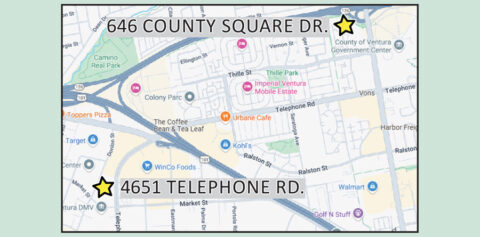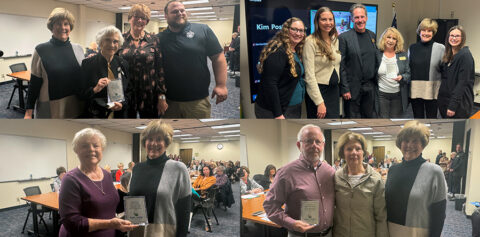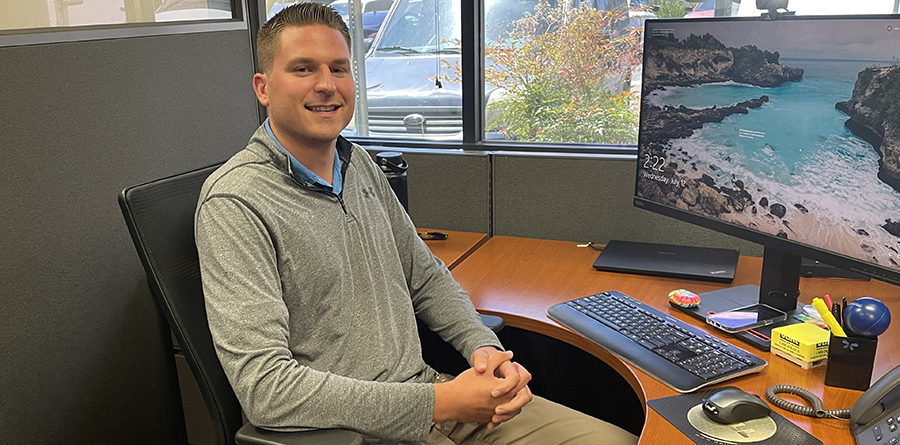Right after graduating from CSU Channel Islands, Mason Lewis joined the VCAAA staff at the start of the pandemic as an emergency meal delivery driver. He has since worked his way up into managing the agency’s meal delivery programs. This service plays a crucial role in helping feed the County’s older adults who might not be able to leave their homes. Here is his story:
Q: Tell me a little about your background.
A: I grew up in Northern California, near Sacramento, in Auburn and Meadow Vista. I lived there for the first 21 years of my life. Then I moved down to Camarillo to go to CSU Channel Islands, where I studied organizational communication. I got my bachelor’s degree in 2020 in the midst of the pandemic. During my senior year, I had an internship with the Human Services Agency in the HR department but once the COVID pandemic started that came to an end. So, then I started here at VCAAA as a disaster service worker in May of 2020, doing meal delivery routes.
Q: How did you get connected with the VCAAA? Did HSA send you over here?
A: Yes, the internship came to an end, and I was put on a disaster service worker list. There were only a couple of opportunities and I think this was the first one that I was offered. They were seeking delivery drivers for the food boxes.
Q: What do you remember most about that time?
A: At the time, I knew very little about the agency and what role it played in the County so I was unsure of what the job would look like. Obviously, it was a very weird time for everyone because no one really knew what was going on due to the environment of uncertainty brought on by the pandemic. So, I was focused on finishing school first and foremost. Then I graduated in May and started working here a week later. The timing worked out pretty well. Being part of the disaster relief effort was a really unique experience.
Q: So that eventually led to full-time employment here?
A: As people were sent back to their original positions throughout the County, other positions here at the agency within the food programs opened up, including the program manager role. So, I started managing the program about a year and a half ago and that was the path to where I am now: the internship, to the pandemic, to the delivery driving, to managing the programs.
Q: Explain the VCAAA’s meal delivery programs for someone that doesn’t know about it.
A: Throughout my time here, we’ve had two different programs that make up our Senior Nutrition Program Food Pantry. One is our food box program, which consists of a grocery box tailored by our dieticians. We’ve had different iterations of this one, and different qualifications for each. When I first started here, anyone over the age of 65 or with a disability would qualify to receive this food box once every two weeks. And then the next iteration, once the County started to reopen and people had the ability to go out again, we changed the requirements and only clients who weren’t comfortable leaving their home to obtain food qualified. Later, we shifted from a two-week box to a monthly box. Throughout the program’s different iterations, our main focus was to deliver shelf-stable foods and fresh fruits and vegetables that clients who were sheltering in place could use to make their own meals with. That program made up most of our pantry operations as we had more than 1,000 active clients at one point. We also have our Project Room Key program, which has been going on throughout my time here. That program is focused on individuals who are temporarily living in hotels, and we partner with a local restaurant, Slate, who contributes fresh meals and logistics to ensure those clients receive food weekly.
Q: How much food are you sending out each week?
A: We send out roughly 80-100 boxes each week for our food box program, each one containing 30 meals, so a little under 3,000 meals weekly. And for Project Room Key, right now we are sending out 127 boxes a week, and that one contains 12 meals per box. So, we distribute upwards of 3,500 shelf stable and fresh meals each week.
Q: When the pandemic was happening, and these people couldn’t leave their homes, what was the reaction like when you would drop off a meal? You were possibly one of their only visitors and I imagine they were very happy to see you.
A: Yes, a lot of our clients were thrilled to see us. It was really nice to spend time with them, especially knowing that they were isolated, and some were living alone as they were labeled a more vulnerable population. There wasn’t much human interaction at the time as it was discouraged in order to stop the spread of the virus so many of our clients really enjoyed us being there and taking a few extra minutes to chat about whatever was going on at that point in time. It was a rewarding aspect of being a delivery driver and a disaster service worker because that’s where we got to see our efforts in the office and pantry come to fruition. So, it was nice to be in that position for a while, going out and making contact with those clients who had essentially become detached from society due to the pandemic. Seeing the same clients regularly was beneficial, as we usually had the same delivery route. It was nice because you could build some rapport and a relationship with each client as we would deliver every few weeks. We still emphasize this today. Our drivers do a great job of being personable and brightening our clients’ day with each delivery.
Q: Now that you’re managing the program, what is a day like for you?
A: The main goal is to keep our delivery schedule intact and the programs operating smoothly each week while accommodating all of our clients’ needs. I’m responsible for ordering all of the food for our programs, as well as acquiring things like boxes, tape, and other necessary materials. So day-to-day tasks include route management, placing food orders, storekeeping, and communicating with clients. There’s some data management for the food that we send out that I’m responsible for as well. I also work closely with our Senior Nutrition Farm in Oxnard to bring in the produce that they grow so that it can be added to the boxes. We have a really good team that does a great job and goes above and beyond to make sure everything gets done each day.
Q: It must take a real team effort to make this work, between you and a few other staff members and your volunteers.
A: To go back to when I first started, I began as a delivery driver. At that point we had a couple of program managers, a pantry crew of five, a logistics staff of six, and roughly 15 delivery drivers. I remember when I first started here, my supervisor Monique Nowlin made it very clear that although you may have one defined role, it’s a team effort, and everyone’s responsible for working together and picking up the slack as needed. We’ve done a great job of keeping that idea in the forefront of our programs, and that includes our volunteers. Some volunteers have consistently made food deliveries for us, which has been a tremendous help. We’ve also had volunteers come at the last minute when we needed help packing in the pantry. And other agency staff from different departments have put on plastic gloves and made bags in the pantry even when it wasn’t part of their job. Today we have a staff of just four, so that’s a big factor in the program’s success, everyone buying into the team mentality. We do a great job of working as a cohesive unit, which allows us to keep the programs running smoothly.
Q: What do you like most about your job?
A: Being able to speak to the clients and hear how thankful they are for the food and services that we provide. That’s the most rewarding part of it. I don’t get to speak to them face-to-face as much anymore because I’m not making the deliveries, but that’s definitely my favorite part. It’s rewarding to hear from the clients who receive a box from us and hear them express how much it helps them while also positively impacting their lives. I’ve also really enjoyed the relationships I have made throughout my time here. This includes our clients, staff, volunteers, and other individuals I have worked with along the way.
Q: Are there any stories that stand out for the clients that you’ve helped?
A: One story that comes to mind would be when a driver reported something abnormal about a client and their home during a delivery attempt. We had a client up in Ojai who didn’t respond to our driver’s knock on the door when he arrived to deliver food. Our driver thought that was unusual, so he asked a few neighbors and tried to get some more information before leaving. He reported that there was a strange smell, and the client was usually around to greet him upon arrival. So, our agency sent someone out to check on the client and it turned out there was a gas leak in the client’s home. The fire department was called, and they went in and were able to get the client out unharmed. Thankfully, everything turned out okay and the leak was fixed. This is just one example of our drivers going above and beyond to ensure the well-being of our clients.
Q: What are the skills that helps someone in your position to succeed?
A: Being unselfish and being a team player is key. For our team, which is pretty small compared to what it once was, we have one person assigned to each task but we all rely on each other to help out when needed. So, it’s important to recognize that you’re part of a team because it takes everyone working together to keep the program running optimally.
Q: Is there anything else people should know about the meal delivery program?
A: I want to emphasize how important donations are. Not just the volunteers who donate their time, but also local companies and people who donate things. Proctor & Gamble, our latest one, donated paper towels and tissues. When our clients express their gratitude for the boxes, they often mention how much they need things like these since they can’t get to the store. And then today, a local family with a farm donated a few boxes of avocados and lemons. It may not sound like much, but it really excites the clients to have something new and fresh in the boxes. There’s also the Letters of Support campaign, which our clients love. The pictures, artwork, and handwritten cards that we include in boxes are always appreciated. At one point we even received a bunch of candy that was donated by See’s, and that was a big hit. So, all of this is not something that should be overlooked.
A: Do you have any specific donation requests if people want to help?
Q: Paper products and diapers. At one point we had a large stock of diapers and we could handle any of our clients’ requests. But at this point we don’t have any more diapers or toilet paper. Those are the most critical items that are often needed by our clients. So, if someone knew of an individual or outfit that could make these items available, I’d encourage them to reach out to our agency.
Q: This type of job isn’t what you went to school for. Is it fair to say you kind of fell into this position?
A: I would say I fell into it, yes, but I would also say I’m grateful to be in this position. A lot of job sectors were affected during the pandemic, and I was fortunate to land here. As a young professional this has been a great start to my career, and it has allowed me to gain some valuable experience. Also, my family has a county background as both of my parents worked for another county for quite a while so that contributed to the decision as well.
Q: What are your future goals?
A: I’m currently still figuring that out and deciding what my next move will be. I’m passionate about several things, like sports and the outdoors. And I would like to work for a non-profit at some point, specifically in land or animal conservation.
Q: Who is someone who inspired you or helped you get to where you are?
A: I would say my whole family. I’m thankful to have had a great support group that taught me right from wrong and showed me what it means to be kind, compassionate, and hard-working.
Q: What do you enjoy away from the office?
A: I like sports and the outdoors the most. On the weekends I’m usually hiking or playing golf or at the beach. I spend time with friends, going to concerts or enjoying recreational activities.
To learn more about the Senior Nutrition Program, visit vcaaa.org/nutrition, or call (805) 477-7300 to see if you might qualify for home-delivered meals.

